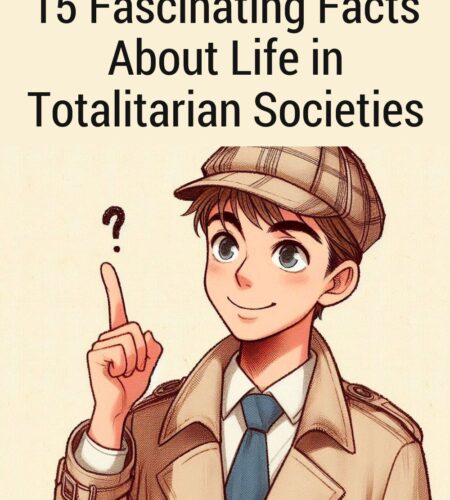Introduction:
Living in a totalitarian society can be a bewildering experience, where individual freedoms are restricted, and the government exercises complete control over all aspects of life. In this article, we will explore 15 fascinating facts about life in such societies, shedding light on the often perplexing and burtsorthy nature of their existence.
Fact 1: Limited Freedom of Expression
One hallmark of living in a totalitarian society is the severe limitation on freedom of expression. Citizens are often forbidden from openly criticizing the government or sharing dissenting views. Communication platforms are closely monitored, and any signs of resistance may result in severe consequences.
Fact 2: Censorship and Propaganda
Censorship and propaganda play a vital role in maintaining control over the population. The government typically controls the media, filtering and manipulating information to fit its agenda. Propaganda is used to shape public opinion and maintain the regime’s narrative, leaving the citizens with a limited understanding of the world beyond their borders.
Fact 3: Surveillance State
Totalitarian societies are notorious for their extensive surveillance systems. Citizens are constantly monitored, both physically and digitally. Government agencies use advanced technology to track their every move, instilling fear and paranoia among the population.
Fact 4: Limited Access to Information
In such societies, access to information is tightly controlled by the government. Independent and critical sources of news are scarce, leaving citizens with a narrow perspective on local and global events. This lack of information further restricts their ability to form well-rounded opinions.
Fact 5: Suppression of Intellectualism
Intellectualism is often seen as a threat to totalitarian regimes. Individuals with intellectual pursuits or academic achievements are closely monitored and sometimes targeted. This suppression of intellectualism leads to a stifling of innovation and progress within society.
Fact 6: Control over Education
Totalitarian governments have a firm grip on the education system. Curricula are carefully designed to indoctrinate students with the regime’s ideology from a young age. Critical thinking and alternative perspectives are discouraged, reinforcing the government’s control over the population’s thoughts and beliefs.
Fact 7: Lack of Privacy
Privacy is virtually nonexistent in totalitarian societies. Citizens are often required to report on their neighbors, friends, and even family members. This pervasive lack of privacy creates an atmosphere of suspicion and fear, where trust is scarce, and personal relationships are strained.
Fact 8: State-Enforced Uniformity
Totalitarian societies emphasize conformity and discourage individuality. Citizens are expected to adhere to strict dress codes and behavioral norms dictated by the government. Deviation from these norms can lead to social isolation or even punishment by the state.
Fact 9: Restricted Travel
Travel restrictions are a common feature of totalitarian societies. Citizens often face significant hurdles when trying to travel abroad. The government maintains tight controls on passports and travel permits, limiting their citizens’ exposure to foreign influences and ideas.
Fact 10: Cult of Personality
Leaders in totalitarian societies often cultivate a cult of personality around themselves. The regime glorifies the leader, presenting them as all-powerful and infallible. This cult of personality serves to reinforce the regime’s control over the population and suppress any potential challenges to the leadership.
Fact 11: Forced Labor and Lack of Workers’ Rights
Totalitarian societies frequently exploit their citizens through forced labor and lack of workers’ rights. The government may employ compulsory labor programs, forcing citizens to work for minimal or no compensation. Unions and worker protections are often nonexistent, leaving employees at the mercy of their employers.
Fact 12: Limited Access to Basic Necessities
Citizens in totalitarian societies often face limited access to basic necessities such as food, healthcare, and housing. The government controls the distribution of these resources, often favoring loyal supporters or certain societal groups while neglecting others. This creates stark inequalities within the society.
Fact 13: Secret Police and Informants
Secret police forces and informants are integral to the functioning of a totalitarian society. These entities work covertly to maintain surveillance, root out dissidents, and instill fear in the population. The constant threat of being reported or detained leads to a pervasive atmosphere of self-censorship and conformity.
Fact 14: Suppression of Religion and Belief Systems
Totalitarian regimes tend to suppress religious and belief systems that they perceive as a threat. Places of worship may be monitored or even closed down, and adherents of certain faiths may face persecution or discrimination. The government aims to replace traditional belief systems with its own ideology.
Fact 15: Limited Social Mobility
Social mobility is often hindered in totalitarian societies. The government controls access to education, job opportunities, and promotions, often based on loyalty to the regime rather than merit or qualifications. This lack of upward mobility further contributes to a sense of powerlessness and frustration among the citizens.
Conclusion
Living in a totalitarian society presents numerous challenges and restrictions on individual freedoms. From limited freedom of expression and information to pervasive surveillance and control, the lives of citizens in such societies are defined by their conformist nature. Understanding these fascinating facts provides us with insights into the complexities and difficulties faced by those living in totalitarians societes. By shedding light on these issues, we can work towards fostering societies that uphold human rights, freedom, and individuality.
Subscribe to our email newsletter to get the latest posts delivered right to your email.




Comments